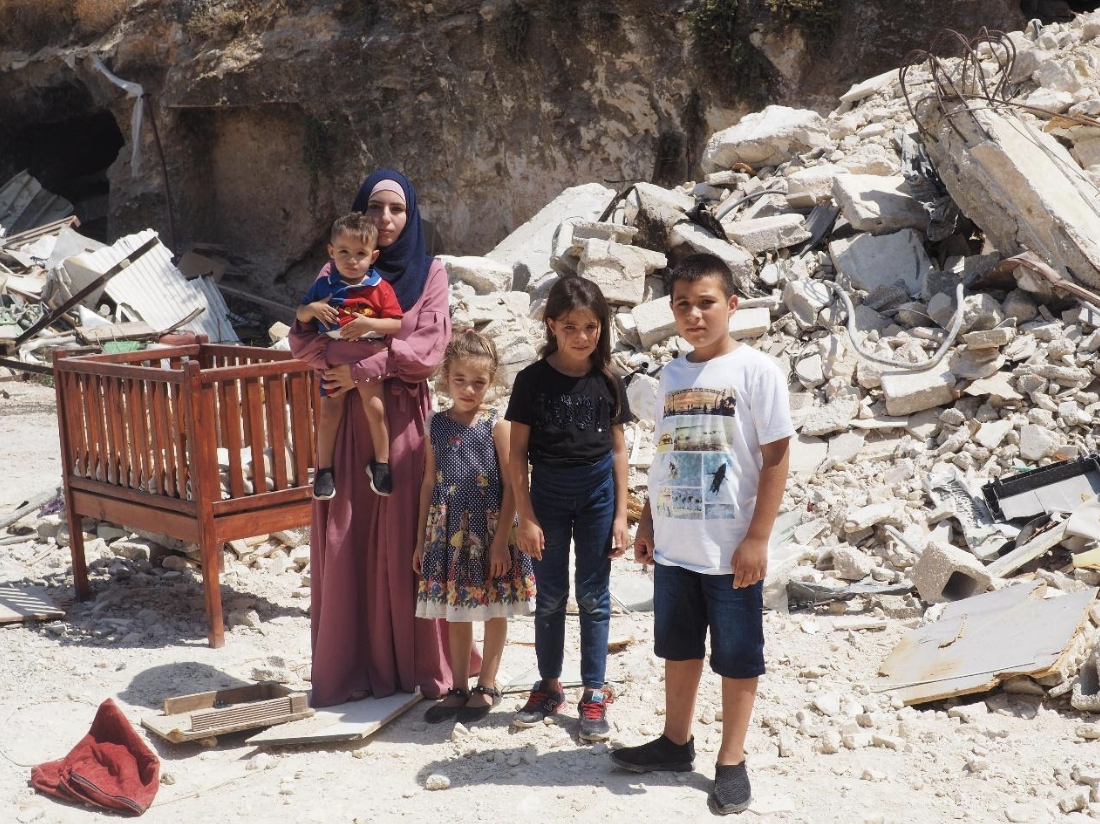How UNRWA USA supporters helped the Burqan family rebuild their lives
restoring hope: how unrwa usa supporters helped the burqan family rebuild their lives
Heba Burqan and her husband Anas got married in 2009 and have four children Majd (9), Batool (7), Juri (6), and Ali (1). The Burqans had a house in beautiful, lush Wadi Yasul, East Jerusalem, where they lived alongside many members of their extended family. They painted the walls with bright colors and made a garden in the courtyard where they grew mint and flowers.
Two years ago, the Israeli military demolished their house and 100 others in East Jerusalem displacing hundreds of Palestinians day by day. This is part of an ongoing practice of forced displacement, a practice determined illegal under international law, that saw a spike in 2019.
Juri, Batool, Ali, and Majd Burqan under one of their garden’s remaining lemon trees
April 30, 2019, was the day the Israeli police came to demolish Heba’s and Anas’ house. It was 6:00 in the morning when noise from outside suddenly woke the family up
Before they realized what was going on, the entire neighborhood rushed to help and stop the demolition. They tried to block the police with their cars and Heba’s brother-in-law tied himself to the gate, but to no avail – the policemen reached the house.
“We are going to demolish your house on top of your head,” one of them shouted through the window in Arabic. Coming into the courtyard, which by then was full of neighbors, the policemen beat up anyone in their way.
As this happened Heba could only think about protecting her children.
“The kids were terrified of the chaotic situation, they kept screaming to the policemen to stop beating their dad; he was arrested and they thought he was dead,” said Heba, who at that moment, decided to take her children and leave the house, as she could not bear her children witnessing such violence.
She rushed her children into the car as soon as possible and left the area. In their hurry to escape, Heba realized her son Majd was not with them. After the police were gone, they found Majd hiding in the garden. He didn’t want to leave his home. But now everything had been destroyed, the family could only save a few pieces of kitchen furniture. The police even demolished the animal shelter and the olive trees surrounding the garden.
“UNRWA support has been crucial: after the demolition, even if we received some help from our community, we would no longer be able to support ourselves without UNRWA.”
In the following days, Heba moved to her father-in-law’s house with Ali and Majd while Juri and Batool went to live with Heba’s mother. Anas was taken to court and charged with assaulting a public official. A few days later, Heba and her mother-in-law were summoned to the police station for questioning. Anas was released four days later with a ban to visit the area surrounding his demolished house.
UNRWA Crisis Intervention Unit in front of the demolished house
“I remember that the social workers from the UNRWA Crisis Intervention Unit had come before the demolition took place, but we were scared and suspicious, so we didn’t accept UNRWA help at the time,” Heba explains. “However, UNRWA social workers returned after the demolition and immediately helped us through psychological support, especially for the kids. Thanks to UNRWA cash assistance we were able to buy new furniture, clothes for the children, food, and pay three months’ rent for a new apartment.” She concludes: “UNRWA support has been crucial: after the demolition, even if we received some help from our community, we would no longer be able to support ourselves without UNRWA.”
After assessing Heba’s family needs, UNRWA provided case management and referrals to specialized services. This included psychological support, food parcels, non-food items, and toys for the kids. The case management was prolonged due to the extent of the trauma Heba’s family endured. It wasn’t until the end of 2019 before the family started to recover. In terms of financial support, the family received two payments, one initially right after the incident to help with the immediate ramifications of the incident and the second, three months after to help rent and secure house accommodations for the family.
How UNRWA USA funds the Crisis Intervention Unit, supporting UNRWA’s Protection programming
The Crisis Intervention Unit, within UNRWA’s protection programming, was co-funded by UNRWA USA and ECHO in 2019 and was established to support families like the Burqans, affected by international human rights abuses and armed conflict. In partnership with the Firedoll Foundation and generous individual donors, UNRWA USA supported the provision of emergency humanitarian response for Palestine refugee families who suffer from forcible displacement as a result of house demolition, eviction, military incursions, and/or settler violence. In 2019, UNRWA USA supporters funded such relief efforts for 95 refugee families, including the Burqans. This was an especially significant year, due to the large number of structures demolished specifically in East Jerusalem, causing a funding gap that was filled thanks to the generosity of UNRWA USA donors.



